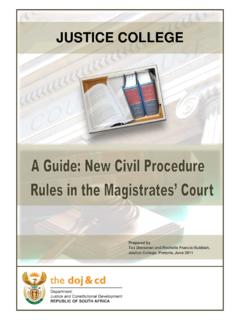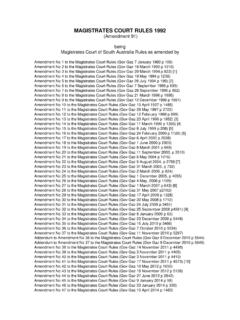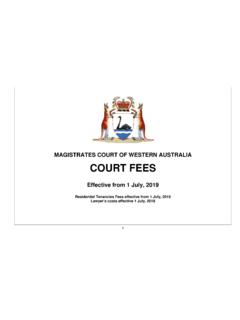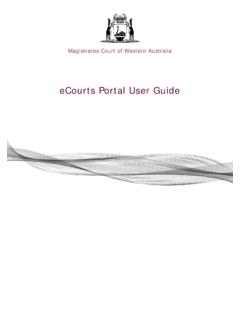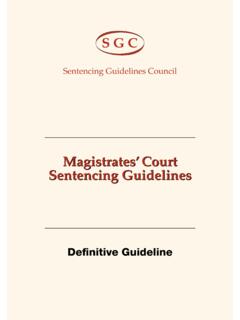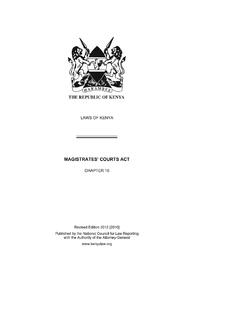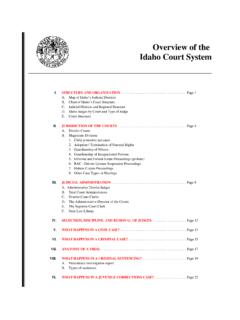Transcription of At court: Being a Defendant in a Magistrates’ Court ...
1 Protecting and advancing the principles of justiceAt Court : Being a Defendant in a Magistrates CourtAt Court : Being a Defendant in a Magistrates Court This leaflet is to help you understand what will happen if you are charged with a crime and told to go to a magistrates Court All criminal cases start in a magistrates Court . Your case could be heard by two or three magistrates or one District Judge in this Court . Magistrates are not lawyers. They are supported by a legally trained adviser. District Judges have been trained in the law. A District Judge could hear your case instead of magistrates. What happens at a hearing? Your case will be called and you will go into the courtroom. You might have to sit in the dock. A hearing is used to decide if you will need a trial. At a first hearing you will: Be told what offence you have been charged with; Be asked to say your name, address, date of birth and nationality; Be asked to say if you are guilty or not guilty of the offence.
2 This is called a plea. You will only have a trial if you say you are not guilty and did not commit the crime. If you have a trial the Court will tell you what you need to do to get ready for it. You could be told to go to the Crown Court for your trial or sentence. This might happen if the crime was serious. You might want to get a lawyer (a solicitor or a barrister) before your trial: Find a solicitor at: Find a barrister at: What happens at a trial? The prosecutor says that you committed the crime. The prosecutor will say why you have been charged with the offence. Witnesses might be asked questions about what happened. You will also have a chance to give evidence and to have your say about what happened. The magistrates or District Judge will listen to both sides. They will decide if you are guilty or not.
3 This is called the verdict. How should I behave in the courtroom? Going to Court is serious. Show respect to everyone. Ask questions if you do not understand what is happening. Raise your hand quietly to tell people you would like to speak. Sometimes it is hard to hear in the dock. Tell someone if you cannot hear. When you speak to a District Judge or magistrate you should stand up and call them Sir or Madam . The press and public are usually allowed in the courtroom. Do not speak to family and friends when you are in the courtroom. Turn your phone off or put it on silent mode. Do not use it. Your Plea If you are going to say you are guilty, you should do this as soon as possible. If you plead guilty your sentence might be reduced. The earlier you tell the Court you are going to plead guilty, the more the punishment can be reduced.
4 This is for your information. It is not meant to tell you to plead guilty if you are not guilty of the charge. Get legal advice. What is a sentence? A sentence is the punishment you will get if you are found guilty or you plead guilty. Your sentence could be a fine, a community sentence, a driving disqualification, prison time or something else. You could get a suspended sentence. This means you will not have to go to prison unless you commit another crime. You might have to do something like unpaid work, or go to meetings with a probation officer. These are called requirements . If you do not do what you are told you could be punished, and you could be sent to prison. You can find out about the sentences for different offences here: A judge or magistrate will consider many things when deciding what sentence to give you. For example, if you have other convictions you might get a bigger punishment.
5 Find out more here: What happens if I get sent to prison? If you are sentenced to prison time you will have to go straight to prison from Court . You might not be able to speak to family or friends. Friends or family can arrange to visit you when you get to prison. The judge or magistrate will tell you how long you will spend in prison. If you did not hear or understand you should ask the legal adviser, magistrate or your lawyer to explain it again. Your criminal record If you are found guilty you are likely to get a criminal record, even if you do not think the crime was serious. This can have a big impact on your life. You might have to tell your employer, or declare it when you apply for jobs. It might stop you travelling to some countries for work or holiday. Get legal advice about what you must declare. Appeals People who have been convicted of an offence in the magistrates Court can appeal to the Crown Court if they think that the verdict or sentence was wrong.
6 You can find the appeal form here: OR You can ask Court staff for an appeal form. If you are sent to prison, you can ask for help with the process. OR you can get information online at: Do this as soon as you can. There is a 21 day time limit on when you can apply for an appeal. If you have more questions speak to the duty solicitor or Court staff.











